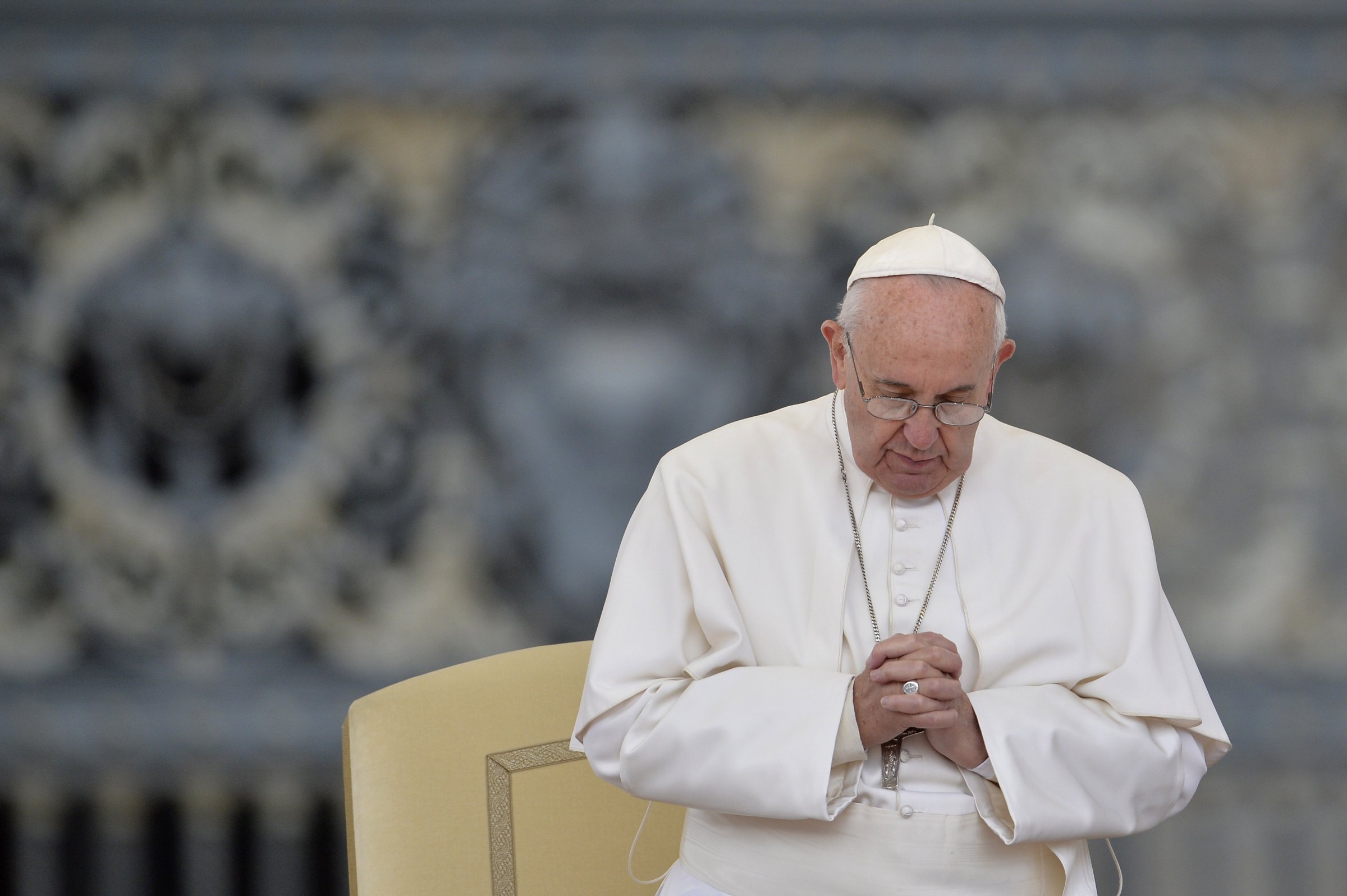
Controversy erupted on Wednesday over reports that Kim Davis, the Kentucky clerk who refused to issue marriage licenses for gay couples, met with Pope Francis on Thursday in Washington after his speech to the U.S. Congress. The Vatican at first did not confirm or deny that the meeting took place, but a spokesman later said, “I don’t deny that the meeting took place but I have no comments to add.”
Davis had a private meeting with Pope Francis, her lawyer Mat Staver of the Liberty Counsel tells TIME, adding that there were no other groups present beyond security and the papal entourage. The meeting lasted less than 15 minutes, Staver says, just enough for a short conversation. “There was not a specific discussion about her case,” he says.
Staver also says he does not know what Pope Francis was briefed about in advance of the meeting or how much he knew of Davis’ case. “We didn’t provide any material,” about Davis as background to Vatican officials beyond the standard required personal information required for security screenings, Staver says, “but her story has been published worldwide, so there was nothing that was necessary to provide.”
Davis, Staver, and officials at the Vatican embassy in Washington D.C. first began to discuss the possibility of a meeting on Sept. 14, Staver says. Final details were determined closer to the actual meeting. Davis originally had planned to be in Washington the following night for an event at the Values Voters Summit, but she and Staver moved their flights a day earlier so they could be at the Vatican embassy Thursday afternoon.
Staver also says he was in touch with the Vatican before he released the information about the visit on Tuesday. “We were very conscious of timing just to be sure that we didn’t interfere with anything with the visit of Pope Francis,” Staver says. “Kim Davis has never wanted the focus to be her, she is not that kind of a person.”
Davis does not have photos of her actual meeting with Pope Francis, Staver says, but she does have photos of her and her husband waiting to meet the Pope inside the Vatican’s embassy, and photos of the rosaries.
A bit of background: the Vatican does not usually request these types of meetings, but will sometimes accept invitations. When Pope Francis had two priority private meetings during his trip to the U.S.—a visit to the Little Sisters of the Poor and a meeting with sex abuse victims—a Vatican spokesman informed the press about the events and gave details shortly after they happened, even explaining why they were important to Pope Francis. The Holy Father gives rosaries to and prays for everyone he meets, so Davis’ claims about the pope’s words and gift of a rosary do not appear to be unique. Staver told the New York Times that U.S. bishops did not arrange the meeting, but that unnamed Vatican officials did. He did not confirm which Vatican officials were involved to TIME.
The meeting is particularly controversial following Pope Francis’ words in a press conference during his flight back to Rome. The pope answered a question about whether or not he supported religious liberty claims of people, like government officials, who say they cannot discharge their duties, for example when issuing marriage licenses to same sex couples. “Conscientious objection is a right that is a part of every human right,” Pope Francis said, clarifying that he was not commenting on a specific case. “It is a right. And if a person does not allow others to be a conscientious objector, he denies a right.”
The fervor around the Davis meeting is a reminder that Pope Francis’ actions can be divisive. In Cuba he privately met former Cuban president Fidel Castro in his home—when Pope Benedict XVI met with him in 2012, Castro came to the Vatican’s embassy—prompting concern among Cuban exiles. He also did not meet with Cuban dissidents. When asked on the flight to Washington if he wanted to meet dissidents, he said that his embassy in Havana made it “very clear” that he was not going to give audiences, either to dissidents or heads of other states who were in Cuba for his trip. “I like to meet everyone,” Francis said. “Because first and foremost I think every person is a child of God, with rights. Second, because meeting another person is enriching. Yes, I would like to meet with them.”
No matter what happened, the Davis meeting is a new test to see how deep Pope Francis’ message sinks in. The pope has repeatedly said that he wants to build bridges, not walls. ���Open hearts, open minds. If you are different than me, why don’t we talk?” Francis told youth in Havana. “Why do we always throw rocks at that which separates us? At that in which we are differing? Why don’t we hold hands in that which we have in common? Motivate ourselves to speak about what we have in common, and then we can talk about the differences we have. But I said, talk, I didn’t say fight. I didn’t say close ourselves in.”
More Must-Reads from TIME
- Donald Trump Is TIME's 2024 Person of the Year
- Why We Chose Trump as Person of the Year
- Is Intermittent Fasting Good or Bad for You?
- The 100 Must-Read Books of 2024
- The 20 Best Christmas TV Episodes
- Column: If Optimism Feels Ridiculous Now, Try Hope
- The Future of Climate Action Is Trade Policy
- Merle Bombardieri Is Helping People Make the Baby Decision
Contact us at letters@time.com